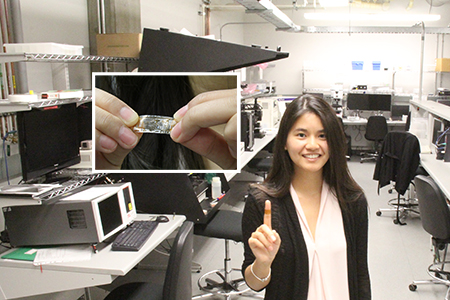
Wrapped around her finger: Electrical engineering PhD candidate Gem Shoute displays circuitry set on a thin film. Inset: a close up of the flexible circuit. Shoute is presenting her research into flexible metal oxide devices at the Falling Walls competition in Berlin.
(Edmonton) A PhD candidate in the Department of Electrical and Computer Engineering is presenting her revolutionary research at the prestigious Falling Walls competition in Berlin.
Gem Shoute, whose research lies in the middle ground between electrical and materials engineering, will present her research into the development of flexible metal oxide devices that would expand the application space of electronics.
Falling Walls is an international competition challenging academics and professionals under 35 to explain how their research is redefining their fields and breaking down the walls to the next major scientific breakthrough-in just three minutes.
Shoute's research, under the supervision of ECE professor Doug Barlage, could break down two "walls" in the electronics field: rigidity of silicon-based electronic devices and the electronic performance of flexible devices.
Silicon is the dominant material in the computing and electronics industries but it is rigid, brittle, and requires high temperatures to build. This makes it less than ideal for emerging applications that require devices to be physically flexible.
Academia and Industry are attempting to address this by using metal oxide semiconductors, which can be built at lower temperatures and are flexible, but have been limited in its application by its low power capabilities.
"Their electrical performance is still lacking, even though they're in commercial production as switches which drive the pixels in ultra-high definition displays," she said.
If you're able to make an entire circuit with metal oxides transistors, she added, "you can replace the backbone of electronics with one that is light weight and flexible. What gives the U of A the edge is our transistor delivers higher frequency performance and higher power handling capability which allows whole systems to be made."
Shoute says the research project she's involved in is taking a novel approach.
"We build it differently so we can get power performance which is about an order higher (about 10 times higher) than commercially produced metal oxides devices. We are to first to demonstrate a device that performs on par with a conventional silicon devices."
The process could lead to a breakthrough in the design of electronics and computers and could vastly improve devices like wearable monitors-which could be part of the fabric an individual wears.
Shoute began her academic career studying immunology before transferring to electrical engineering, set out in 2012 to start her Master's degree in electrical engineering and, in 2014, transferred to a PhD program.
"What I like about engineering is that you can't get away with just knowing a fact," she said. "You have to know what to do with that fact."
Going even further than that, Shoute's longer-term goal is to establish a startup company after graduation-and help build a high-tech industry in Alberta.
"I really believe we can start something here," she said. "I want to do a startup to turn this into a significant industry. This is ramping up all over the world and we can make an impact right here in Canada."
Shoute believes the Falling Walls competition can help her achieve that goal because it has taken her out of the world of scholarly language and forced her to describe her work to non-technical audiences. Developing her communication skills now will help draw investment when the time comes.
"In order to get any kind of capital you need to communicate the way Falling Walls forces you to. This is my chance to learn how to do this," she said.
Shoute finished in second place for her presentation at the U of A Falling Walls qualifying competition in October, and took home the audience choice award.
The other two top presentations came from students in the Faculty of Medicine and Dentistry. Joshua Lee, a PhD candidate in the Department of Medical Genetics, took third place for his presentation on the use of novel drug that act as a "band-aid" to treat genetic diseases. First place went to Lian Willetts, a post-doctoral fellow in the Department of Oncology, for her presentation on prostate cancer metastasis.
The three will compete against an international slate of 100 young academics and professionals at the Falling Walls competition in Berlin Nov. 8 and 9.